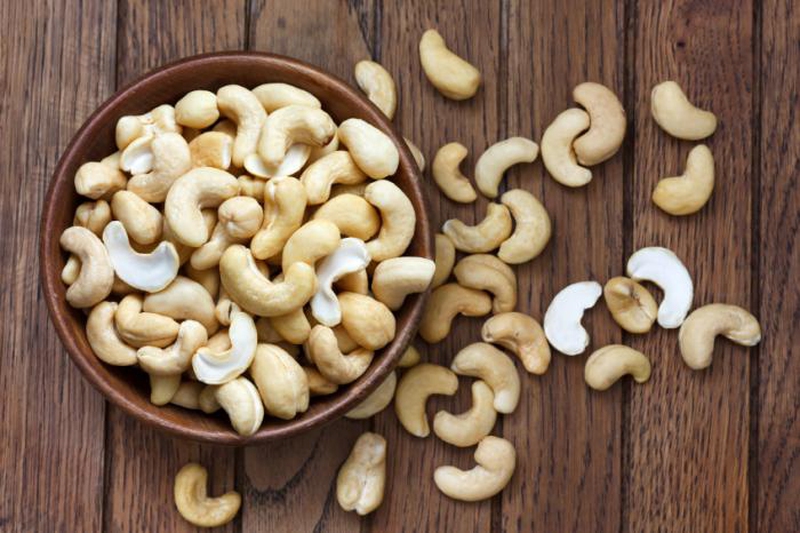Cashew nuts are known as power nuts as they are enriched with several vitamins, minerals and antioxidants. You may enjoy a hand full of crunchy cashews while watching your favorite TV show but you may want to know “are cashews bad for you” in advance. Although, these nuts are full of energy, they might be harmful for some people. Consumption of cashew nuts should be moderate as high consumption may lead to health issues such as high cholestrol, high blood pressure, weight gain, heart issues, allergic reactions, etc. Let’s find more detailed information.

Are Cashews Good for You?
Gnenrally it is good for you. Moderate consumption of cashews can provide a lot of benefits to those who are not allergic to it. However, there are some side effects of cashews, especially to those who have some special conditions. Let us throw some light upon its benefits and side effects of eating cashews.
What Are the Health Benefits of Cashews?
Good for Diabetic People!
Cashews have monounsaturated fats which help to reduce triglyceride levels in a low-fat diet. High triglyceride levels cause heart diseases. Therefore, eating cashews with a low-fat diet is good for diabetic patients.
Take Care of Your Heart
75% of the fat in cashews is unsaturated fatty acids which have oleic acid. Oleic acid is known to improve heart health and helps to avoid cardiovascular diseases. Are Cashews Bad for You? How can we see it is bad when it is beneficial to your heart health?
Keep You Away from a Dentist
Cashews help to improve dental health by destroying the bacteria that decays tooth and causes other gum diseases.
Prevente Gallstones
Nurses’ Health Study conducted a survey on 80,000 women and found 25% lesser chances of developing gallstones in women who eat 1 ounce of nuts per day.
Magnesium and Copper Intake
Moderate amount of magnesium helps to control blood pressure, muscle spasms and fatigues. Copper in cashews helps in the production of energy and melanin. Also, it is good for physiological processes, bone and connective tissue development.
Rich Protein Source
Cashew is a source of protein which is good for improving the immune system by keeping diseases away and for developing and repairing cells and tissues.
Rich in Fiber
Cashews provide digestible fiber to maintain intestinal health and blood glucose levels by regulating the carbohydrates absorption rate.
Vitamins Supplement
Cashews are a source of vitamin B1 or Thiamine and viatmin B6. Vitamin C is also present in it but in low amounts.
Essential Tryptophan
Tryptophan is essential amino acid hich helps to produce hormone serotonin. Cashews are a rich source of tryptophan and it is responsible for good memory, stress relief and healthy sleep.
Side Effects of Cashews That You Should Pay Attention to
Worsen Your Headaches
It is advisable for people who suffer from headaches and migraines to avoid cashews. Cashew nuts consist of Amino Acids Tyramine and Phenyethyamine which help to maintain blood pressure levels and make you feel good. But those who are sensitive to Amino Acids are more likely to have headaches or migraines after eating cashew nuts.
Red Alert: High Sodium Content
If you love to eat salty cashew nuts, you might know the fact that they contain high sodium content. It means that you are consuming large amounts of sodium through cashews, unless you are careful enough to get a can of unsalted cashews from the store. According to nutritionists, the normal requirement of sodium per day for an adult is 1500mg, while the maximum limit for adults is 2300mg per day. Unsalted cashews provide 5mg of sodium per ounce, while salted cashews provide as high as 87g of sodium per ounce. High intake of sodium is harmful for the body as it can lead to diseases such as heart diseases, strokes, high blood pressures and kidney diseases.
Cause Drug Interactions
Cashews are rich in magnesium content, 82.5 mg of magnesium per ounce. However, there are a number of drugs that interact with magnesium, so if you are wondering “are cashews bad for you”, check the medications you have taken. According to the researches, certain drugs that react with magnesium can cause the lack of absorption of antibiotics. For example, Quinoline antibiotics, like ciprofloxacin, bind together with magnesium will prevent the proper absorption of the antibiotic. Similarly, people who take medications for blood pressure, diabetes, thyroid and penicillamine, are also required to avoid cashews because magnesium combines with such drugs may cause water retention and nausea. Therefore, you need to be aware of your drug information.
Lead to Possible Allergies
According to a study that was published in the journal “Allergy”, there is a rise in allergies to cashews. The study reveals that it may affect young children who might be exposed to cashews for the first time. Another article published in the journal “Archives of Disease in Childhood” has raised similar concerns regarding cashew allergies. Anaphylaxis, constricting of the airways, is a disease that is found more commonly in cashew allergies as compared to peanut allergies.
Cause Your Weight Gain
Cashews provide 163 calories per 1-oz portion along with healthy unsaturated fats. If you are not careful about the portion size, then you might gain weight in a short time. Consumption of healthy fats should be moderate. Instant weight gain leads to high chances of suffering from different diseases.
View All Comments /Add Comment